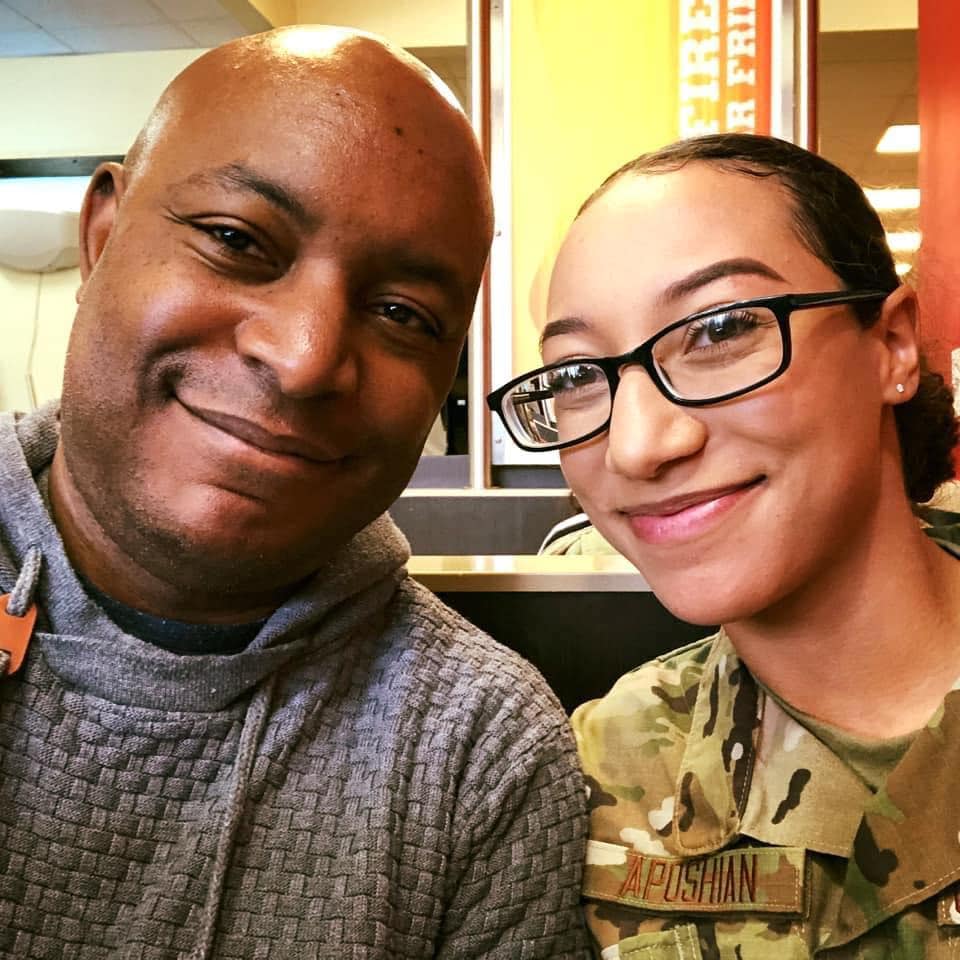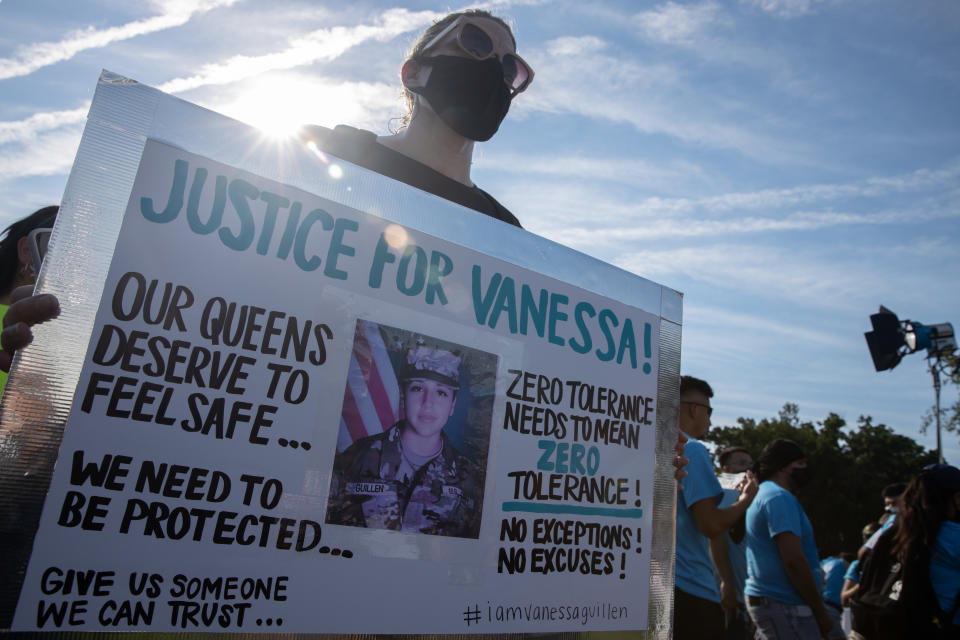After two women were killed on different U.S. bases, the military reluctantly faces its own #MeToo moment
Typically, when the military notifies the family of a deceased service member, it follows a complex set of protocols. Whenever possible, the news is to be given in person, at the family’s home and with a formal script.
Yet Brian Murray found out about the death of his 21-year-old daughter, Natasha Aposhian, an airman first class, after calling her base and being put on hold for 30 minutes.
His mother had called him to tell him about a news report of a shooting at Grand Forks Air Force Base in North Dakota in which two airmen were killed. Meanwhile, Natasha’s mother, Megan Aposhian, had heard from one of Natasha’s friends at the base that she had been shot, and the Air Force put out a press release, without naming her. When Murray called the base, he was put on hold for half an hour before being put through to Col. Cameron S. Pringle, the commander of the base, who confirmed Natasha was one of the airmen in the article.
“The way we found out was awful,” Murray told Yahoo News.
Murray said his daughter was “full of life” and that she “had the world ahead of her.” She was looking forward to her military career and serving her country. Aposhian’s dreams were cut short on June 1, when fellow airman Julian Carlos Torres, 20, shot and killed her in a dormitory, just two months after arriving at the base.
According to documents from the U.S. District Court for the District of North Dakota, Torres “shot and killed Aposhian” and “then shot and killed himself.”
Murray is still in grief over the loss of his daughter, but now he’s looking for accountability, and even more importantly, changes in how the military deals with harassment of its service members, particularly women. “We have a lot of family in the service. We are not anti-military,” he said. “But we want to make sure the safest place you should be is on a U.S. base.”
One of his frustrations is the lack of information about the events leading to her death. Another airman, Daesha Renae Heard, 21, has been recently charged for unlawfully purchasing the gun and transferring it to Torres. Beyond that, however, not much more information about the case has been released. Linda Card, a spokeswoman for the Air Force Office of Special Investigations, told Yahoo News that this is because “the investigation is still open and ongoing due to pending laboratory results.”

Aposhian’s killing comes on the heels of a similar case that has garnered national attention. Vanessa Guillen, 20, a soldier based in Fort Hood, Texas, disappeared on April 22. For weeks, her family pleaded for answers. Her remains were found at the end of June, and prosecutors announced on July 2 they were charging another soldier with killing her and then trying to dispose of her dismembered remains near the base. That soldier, Army Specialist Aaron Robinson, later killed himself when approached by police in July.
Guillen’s family pushed to get attention for her case, prompting veterans, active-duty service members, politicians and civilians to take to the streets and social media to express outrage and demand justice for the young Army soldier. Using the hashtag #IamVanessaGuillen, which trended for weeks, women across the armed services, shared their own experiences with harassment and assault in the U.S. military.
Many believe that if not for the persistence of Guillen’s family, who met with President Trump in July, the case would have probably remained in the shadows. Instead, Guillen’s case helped propel a military #MeToo movement, which has recently exposed how pervasive harassment has been and continues to be for women and men in all ranks.

In 2019, the Defense Department’s annual report on sexual assault revealed there were 7,825 sexual assault reports involving service members as victims or subjects. This is a 3 percent increase over 2018. Also up by 17 percent, with 2,126 reports, was the number of victims who confidentially disclosed an assault without pursuing an official investigation.
Beth Ford Roth is an independent journalist who has covered the military in different capacities for approximately two decades. She’s reported on issues that are important to service members and their families. She says the main reason many of these victims are afraid to report their abusers is “because they have to do so within their chain of command. … Often the harasser or the person who has assaulted them is within the chain of command … and there is a strong fear of retribution.”
According to Guillen’s and Aposhian’s families, both women told them they were being harassed by their aggressors but seemed to have been afraid to report it.
Protect Our Defenders, a nonprofit organization that supports and advocates for service members who have been sexually assaulted, says about 64 percent of women who report assault in the U.S. military face retaliation, and 66 percent who reported retribution alleged that retaliators were within their chain of command.
The organization also reported that about one-third of victims who officially come forward with their assault are discharged typically within seven months. They also face harsher discharges, “with 24% separated under less than fully honorable conditions, compared to 15% of all service members.”
The U.S military has attempted to address sexual assault and harassment by creating response and prevention programs such as the Army’s Sexual Harassment Assault Response Prevention (SHARP). Ford Roth says “it’s a step in the right direction, but it obviously has not solved the problem.”
Just last week, Secretary of the Army Ryan McCarthy held a press conference to address Guillen’s case as well as claims of sexual harassment in the Army.
McCarthy said the Army was introducing a new initiative to address these and other issues across. “We are rolling out Project Inclusion to address behaviors that tear at the fabric of our force. Issues such as a lack of diversity, discrimination, sexual harassment, sexual assault and suicide.”
He also offered condolences to the Guillen family and said the Army was “incredibly disappointed to let Vanessa and her family down.”
But to Guillen’s family, the Army’s apology is too little too late. They are demanding a congressional investigation into Guillen’s death. They are also seeking overall change in both the military culture that enables sexual assault and harassment and the system that is currently used to investigate those crimes.
On July 30, the Guillen family met with Trump in Washington to discuss the I Am Vanessa Guillen bill, which was introduced to Congress a day later. The bill would allow members of the military to report instances of sexual harassment and assault to a separate authority outside their chain of command, creating a new system for adjudicating these type of cases.
Aposhian’s father, who says his family wants the same reforms that the Guillen family are seeking, also points to “a failure of leadership” that contributed to his daughter’s death. For example, he wants to know how Torres was able to keep a private gun in the barracks, which was not allowed and not discovered, despite random checks.
“I’m angry and I’m also frustrated because this could have been prevented,” he said.
Since his daughter’s death, Murray, who also supports the idea of having a third-party reporting system, says he’s heard from a lot of service women about their experience with harassment and abuse.
In the meantime, Murray said he has little faith in the military justice system given the lack of information and transparency the Air Force provided when his daughter died. But he hopes the investigation into his daughter’s death takes a closer look at those at the top, who he says “failed to protect his daughter.”
If his daughter had died serving her country, Murray said, it would have still been devastating, but at least he and his family would have some peace.
“I think the hardest part of this,” he said, “is knowing that it was at the hands of another service member.”
_____
Read more from Yahoo News:

 money
money 

